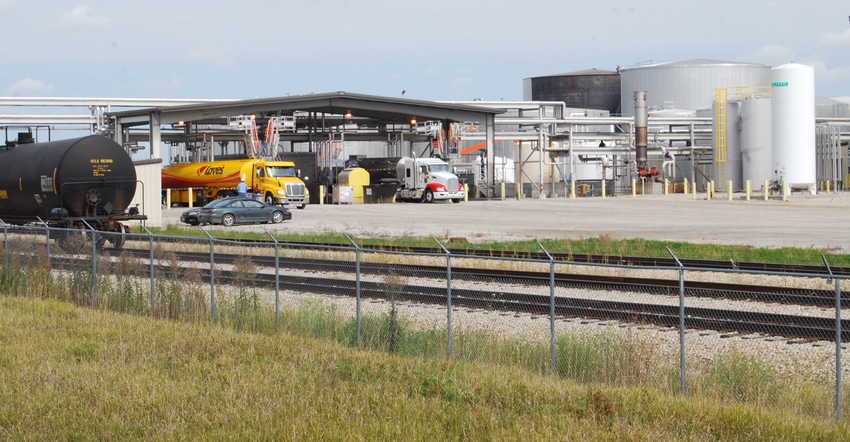
Congress on Feb. 9 passed a one-year retroactive extension of the $1-per-gallon biodiesel production tax credit as part of the two-year federal budget package.
The credit will be applied to biodiesel production for 2017 but is not in place for 2018 as the industry had hoped.
In response to these events, Iowa Renewable Fuels Association Executive Director Monte Shaw issued the following statement: “While we are pleased the credit was restored for 2017, in 25-plus years of monitoring federal legislation, this is the most ridiculous outcome I’ve ever seen. We will continue to work for a quick extension for 2018 and ultimately a commonsense long-term extension.
“When you consider that petroleum is in its 105th consecutive year of federal tax preferences, it is ridiculous that U.S. House members objected to the two-year extension. Today, just as yesterday, the industry has to produce and market biodiesel with no certainty over what the final financial situation will be. That is not any way to run a business.”
Grassley against 1-year extension
Iowa is the leading state in production of biodiesel. While clean-energy advocates were grateful that the so-called “extenders package” was finally moved after a number of false starts over the past two years, some were concerned the tax credits that have been long-sought were only extended for one year.
U.S. Sen. Chuck Grassley, R-Iowa, was angered that the biodiesel blenders tax credit of $1 per gallon, which expired at the end of 2016 (the fifth time in 13 years), was only extended retroactively through 2017 and did not carry a two-year extension taking the credit through this year. Grassley said he had been promised a two-year extension by congressional leadership.
Grassley directed much of his displeasure at House Speaker Paul Ryan, R-Wis., when he told reporters that the one-year extension for the biodiesel tax credit “is contrary to the promise I got from both the leadership of the Senate and the House, including a Nov. 9 telephone conversation I had with Ryan.”
Hopeful biodiesel can get tax credit in future
Kurt Kovarik, vice president of federal affairs at the National Biodiesel Board, issued a statement, saying his group is “disappointed that some of the negotiators prevented the extension from covering 2018.”
Randy Howard, CEO of Renewable Energy Group based in Ames, Iowa, said his firm was “pleased that Congress recognized the importance of biomass-based diesel and its place in the value chain and passed a retroactive extension of the biodiesel mixture excise tax credit for 2017.”
This credit will allow needed infrastructure investments to grow the production and distribution of these valuable renewable products, he said.
“However,” Howard added, “we are disappointed that despite strong bipartisan support, Congress did not complete the job and continue the biodiesel tax credit into the future.”
The credit originated in 2005 and has lapsed five times, prompting a lack of certainty within the industry and among its investors. Some biodiesel producers say the credit is needed to maintain profitability. Otherwise, producers say they will be forced to turn to the Renewable Identification Numbers (RINs) market to sustain margins.
Retroactive pattern worries Iowa Biodiesel Board
Grant Kimberley, executive director of the Iowa Biodiesel Board, said the biodiesel tax incentive extension for 2017 is a step in the right direction. But the government’s repeated policy of letting the credit expire and then approving the credit retroactively is a pattern that leaves biodiesel producers in a precarious position.
“Iowa biodiesel producers are relieved to have the federal biodiesel tax credit restored for 2017,” said Kimberley. “And while we are thankful Congress passed that legislation, the fact that it wasn’t extended into 2018 leaves biodiesel producers in the same precarious situation of having to roll the dice with their business decisions, betting on whether the tax credit will come back for 2018. We are disappointed in this.”
Kimberley added, “We appreciate the work of our tireless champions, in particular Sen. Chuck Grassley, but also the entire Iowa congressional delegation, for their leadership on the blenders credit. We will continue to help them make the case that a long-term extension is good energy and economic policy for America.”
Producers to seek long-term extension
Howard said Renewable Energy Group will continue to work with policymakers on a long-term extension of the tax credit because it is not just smart energy policy, but smart tax policy, too. The incentive helps lower RIN costs while boosting economic development, jobs, farmer support and a cleaner environment.
The retroactive extension means the biodiesel supply chain will see a cash infusion of roughly $2.6 billion, matching the U.S. market for biodiesel last year of 2.6 billion gallons. The funds will be divvied up among blenders and producers, depending on how supply contracts were negotiated. Domestic production in 2017 was roughly 1.8 billion gallons, according to U.S. EPA data.
For years, the National Biodiesel Board and supporters such as Grassley have been pushing to reform the biodiesel blenders tax credit, which allows foreign biodiesel imported into the U.S. to qualify for the credit. NBB and Grassley want to make it a domestic producers’ credit only. The movement has never materialized in approved legislation, despite nearly 450 million gallons of Argentine biodiesel entering the U.S. in 2016 that, once blended in the U.S., qualified for the incentive. Last year, antidumping and anti-subsidy cases were initiated and won by NBB against Argentine and Indonesian biodiesel. The U.S. imposed tariffs that quelled imports from these countries.
About the Author(s)
You May Also Like




